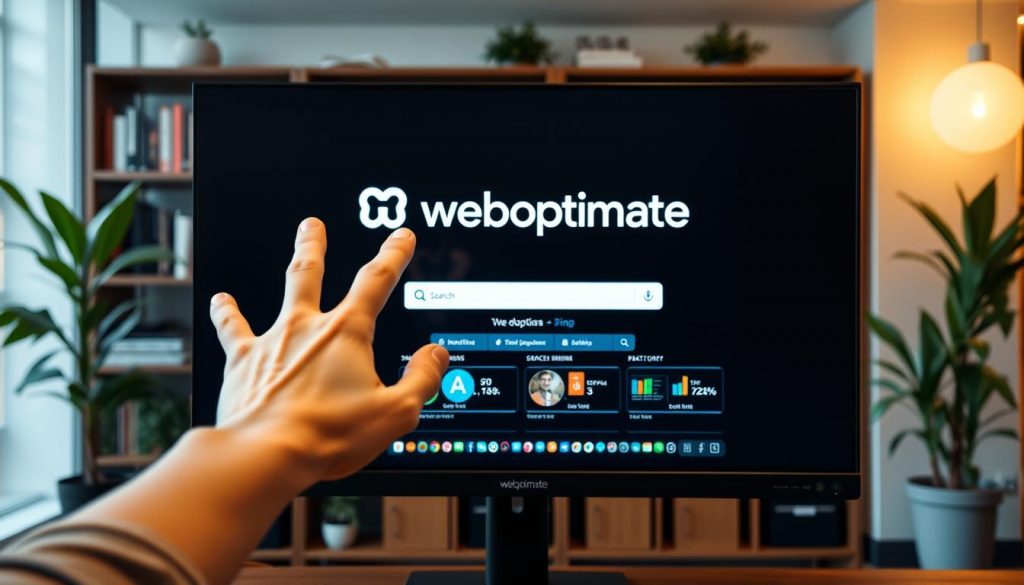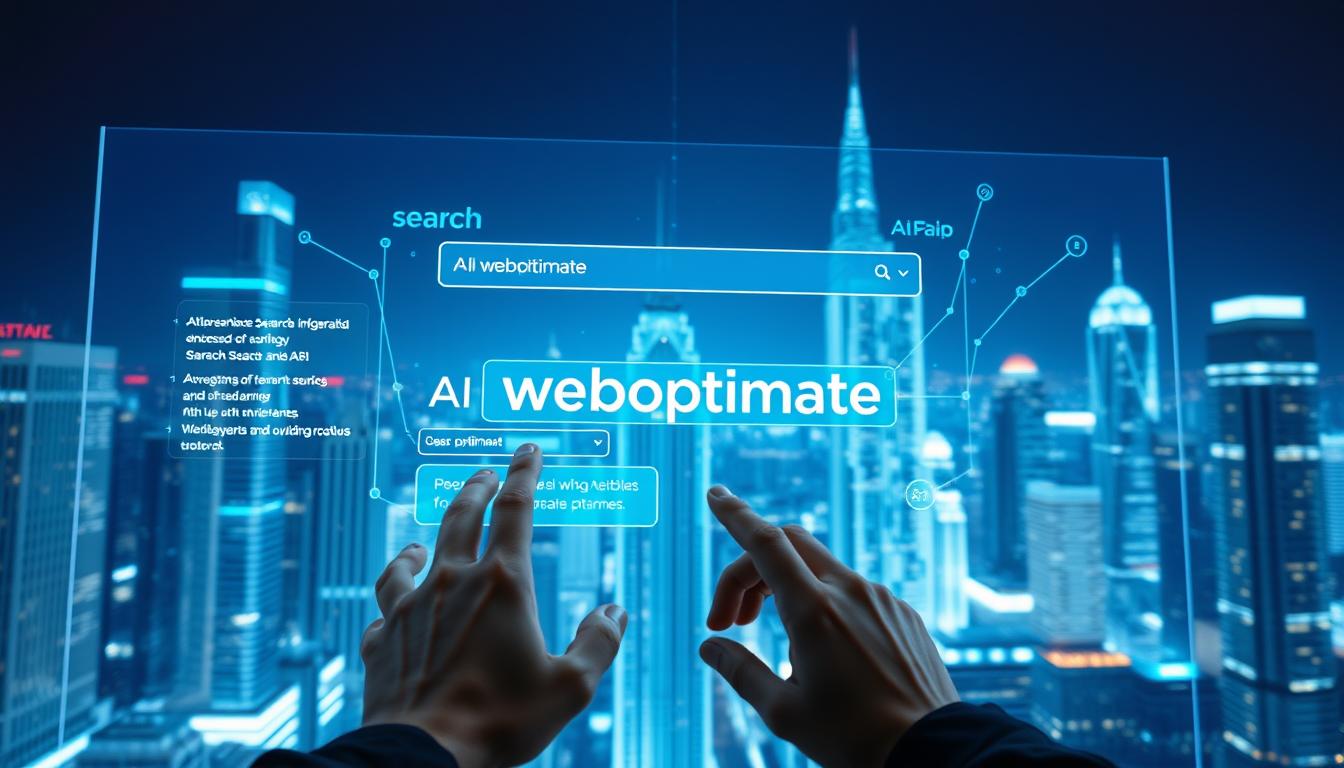We’re seeing a big change in how we find information online, thanks to AI in search engines. This change is more than just making old algorithms better. It’s a whole new way of understanding and answering our questions.
Exploring AI-powered search shows us the tech behind this big leap. It’s changing how we get information and how businesses work. The search engine evolution is affecting everyone.
Key Takeaways
- The role of AI in modern search is transformative.
- AI makes search results more accurate and relevant.
- The integration of AI changes how businesses approach SEO.
- Users get more personalized search experiences.
- The future of search engines depends on AI advancements.
The Evolution of Search Engines
Search engines have changed a lot over the years. They’ve moved from simple text results to complex AI systems. This change has made it easier for us to find and use online information.
From Simple Algorithms to Complex Systems
At first, search engines used basic algorithms to match keywords. Later, these algorithms got smarter, adding things like link analysis and user behavior. This made search engines understand user queries better.
Some big steps forward include:
- Link analysis helped rank pages based on relevance and authority.
- User behavior data improved search results by showing how users interact with content.
- More advanced algorithms now understand the intent behind search queries.
The Pre-AI Era of Search
Before AI, search engines struggled to grasp the context and intent of user queries. Yet, these early systems paved the way for today’s advanced systems.
Pre-AI search engines had big limitations, including:
- They couldn’t fully grasp human language nuances, leading to less accurate results.
- They relied too much on keyword matching, often showing outdated or irrelevant info.
Understanding The Integration of AI into Search Engines
AI is changing search engines to give us better and more personal results. This change comes from two main technologies: machine learning and natural language processing. They help search engines get the meaning behind our searches and make results more relevant.
Machine Learning Fundamentals in Search
Machine learning lets search engines learn from lots of data. This makes them better at showing us what we’re looking for. By studying how we search, machine learning can predict what we might search for next.
Key aspects of machine learning in search include:
- Pattern recognition in user behavior
- Predictive modeling for future searches
- Continuous learning from new data
Natural Language Processing Revolution
Natural Language Processing (NLP) helps search engines grasp the meaning of our searches. It understands the context and intent behind our words. This makes search results more accurate and relevant.
The impact of NLP on search engines is significant:
- Improved understanding of search queries
- Enhanced ability to provide contextually relevant results
- Better handling of complex search queries
As stated by
“The future of search is not just about retrieving information, but about understanding the intent behind the query.”
, showing how crucial NLP is for today’s search engines.
Major AI Technologies Powering Modern Search
The search world is changing fast thanks to AI. These new tools make search engines smarter and easier to use.
Neural Networks and Deep Learning
Neural networks and deep learning are key in today’s search engines. They help search engines understand complex questions and give better answers. Deep learning algorithms look through lots of data, find patterns, and predict what we might want. This makes search results more relevant.
Semantic Search Capabilities
Semantic search lets search engines get what we really mean. It looks at the context of our searches. Semantic search makes our interactions with search engines more natural and easy.
Voice and Visual Search AI
Voice and visual search AI are changing how we use search engines. Voice search lets us use voice commands. Visual search lets us search with images. These features make search more accessible and friendly.
In summary, AI like neural networks, semantic search, voice search, and visual search are changing search. They’re not just making search results better. They’re also making it easier for us to use search engines.
- Neural networks enhance search result relevance
- Semantic search improves search accuracy
- Voice and visual search make search more accessible
How Leading Search Engines Implement AI
Leading search engines are using AI to make searching better and more accurate. This change has made them more user-friendly and efficient.

Google’s AI Journey: From RankBrain to BERT and MUM
Google has been a leader in using AI for search. It started with RankBrain, which helped understand search queries better. Then came BERT, which improved natural language understanding. Recently, Google introduced MUM, a model that handles complex queries in many languages and formats.
Microsoft Bing’s AI Integration with ChatGPT
Microsoft Bing has also made big steps in AI, especially with ChatGPT. This AI model makes Bing’s search results more conversational and aware of context. With ChatGPT, Bing can now handle complex queries better, making it a strong competitor.
Emerging Players in AI-Powered Search
Other players are also entering the AI search scene. They’re using AI to offer new, personalized search solutions. As AI keeps improving, we’ll see even more advanced search engines.
The Impact of AI on Search User Experience
AI has changed how we search online. It uses machine learning and natural language processing. This makes search engines more intuitive and personalized for users.
Personalization and Relevance Improvements
AI helps search engines give personalized results. They look at your search history, location, and preferences. This means you find what you need faster, making your search better.
AI algorithms also analyze lots of data. They find patterns and guess what you want. This makes search results more relevant to you. It makes searching more efficient for everyone.
Conversational Search Interfaces
AI has brought us conversational search interfaces. Now, you can talk to search engines like you would a friend. This makes finding information easier and more fun.
Conversational AI assistants, like voice assistants, are getting more popular. They let you search without typing. This makes searching on-the-go easier and more convenient.
Business Implications of AI-Powered Search
AI-powered search is changing the digital world. It brings both chances and hurdles for companies. As search engines get smarter, businesses must change their ways to stay seen and competitive online.

SEO in the Age of AI
The rise of AI in search engines is changing SEO strategies. Old tricks like keyword stuffing and link farming don’t work as well anymore. Now, AI looks for content that’s relevant and good for users. Companies should make content that really speaks to their audience.
Content Strategy Adaptations
To succeed with AI search, businesses need to rethink their content strategies. They should make content that’s not just relevant but also fits the context. Using natural language processing helps understand what users are looking for. This way, companies can get better search rankings and more visitors to their sites.
E-commerce and AI Search Integration
E-commerce sites face big changes with AI search. To keep up, they must make their product pages better for AI. This means using structured data and keeping product info current. By adding AI search, e-commerce sites can make shopping better for users and boost sales.
By getting the hang of AI search, businesses can lead the way online. They can keep a strong presence in the digital world.
AI Search in the Bangladesh Context
Bangladesh’s digital future is being shaped by AI in search engines. This brings both challenges and opportunities. Understanding the current state of AI search in Bangladesh is key. We must look at local language processing challenges and the digital economy’s potential.
Local Language Processing Challenges and Solutions
One big challenge in AI-powered search in Bangladesh is handling local languages, especially Bengali. Developing NLP capabilities for Bengali is essential. This requires big steps in machine learning and natural language processing.
To solve these problems, researchers and developers are working hard. They aim to create language models for Bengali and other local languages. This means making large datasets and training models to grasp local language nuances.
Opportunities for Bangladesh’s Digital Economy
AI in search engines opens up many chances for Bangladesh’s digital economy. Making information in local languages more accessible can boost growth. This is true for sectors like e-commerce, education, and healthcare.
| Sector | Opportunities |
|---|---|
| E-commerce | Increased accessibility to local products, improved customer experience |
| Education | Access to localized educational content, improved research capabilities |
| Healthcare | Improved access to health information, telemedicine services |
By using AI-powered search, Bangladesh can grow digitally. It’s important to tackle challenges and seize AI search opportunities.
Challenges and Ethical Considerations
AI is changing search engines a lot. We need to look at the good and bad sides. AI search engines are getting smarter, but they also bring up some big worries.
Algorithmic Bias and Fairness Issues
Algorithmic bias is a big problem. It can make search results unfair. This bias can show up in many ways, like favoring some groups over others.
To fix this, developers need to make sure their algorithms are fair. They also need to check their systems often for any bias.
Privacy Concerns in AI-Powered Search
Privacy concerns are also a big deal. AI search engines need a lot of user data to work well. Keeping this data safe and private is very important.
They need to use strong data protection and be clear about how they use user data.
The Filter Bubble Effect and Information Diversity
The filter bubble effect is when search engines show only what you like. This can make you see less of what’s out there. It might even make you stick to what you already believe.
To solve this, search engines can show more diverse results. They can also help users see more different kinds of information.
By tackling these issues, we can make AI search engines better for everyone.
Conclusion
As we wrap up our look at AI in search engines, it’s clear AI will change how we find information online. The way search engines work has evolved a lot. AI makes search results more relevant and supports new ways like voice and visual search.
This technology has big implications for many fields, like e-commerce and digital marketing. In Bangladesh, AI search engines could help the digital economy grow a lot.
But, we also face challenges like AI bias and privacy issues. We need to be careful about these problems. This way, we can keep making search better for everyone.
Looking ahead, finding the right balance between new tech and being responsible is key. We want AI search engines to meet our needs without causing harm.


